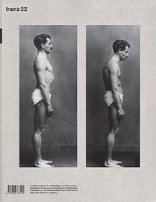Publikation
trans 22
Haltung
ISBN: 978-3-85676-317-6
Beiträge von: Lindsay Blair Howe, Jacques Blumer, Camillo Boana, François Charbonnet, Roger Diener, Martin Dumont, Andrea Alberto Dutto, Brenda Edgar, Sabine von Fischer, Daniel Fuchs, Ernst Gisel, Mélanie Gobet, Jacques Herzog, Eelco Hooftman, Hans Kollhoff, Philipp Kuntze, Léopold Lambert, Made in, Metaxia Markaki, Benjamin Leclair-Paquet, Bonnie Qian, Benoît Sallé, Holger Schurk, Christophe Schuwey, Miroslav Šik, Luigi Snozzi, Andreas Thuy, Connie van Uffelen, Philip Ursprung, Pierre Voélin, Manfred Wolff-Plottegg, To
Sprache: Deutsch oder Englisch
Publikationsdatum: 2013
Umfang: 190 Seiten, 88 Abb. farbig und sw
Format: Softcover, 23 x 29,7 cm
Wie kein anderes brachte das letzte Jahrhundert eine Vielzahl von Manifesten hervor. Auch wenn selten von längerem Bestand, wurden in Architektur, Kunst und Politik mit niedergeschriebener Haltung Rahmenbedingungen abgesteckt. Das gab Sicherheit. Heute scheint alles verhandelbar. Der Idealismus ist tot oder erfolgreich integriert in die Ökonomie der Aufmerksamkeit. Eine Position gilt nur, solange sie sich vermarkten lässt. Dieser Prozess hat sich derart beschleunigt, dass wir den Halt zu verlieren drohen. Doch brauchen wir diesen Halt oder eine eigene Haltung überhaupt noch? Und muss man sich für eine Haltung entscheiden oder generiert sich diese jederzeit beliebig neu? trans22 macht eine Momentaufnahme.
More than ever before, the last century has brought forth a multitude of manifestos. Even if of short constancy, architecture, art and politics have set a framework by positioning themselves. This had an reassuring effect. Today, everything seems to be negotiable. Idealism is dead or has been successfully integrated into the economy of attention. A position is only valid as long as it can be marketed. During the last couple of years, this process has accelerated in such a way that we are threatened to lose our foothold. But do we still need this foothold or an own position? And do we have to decide on one position or does it generate itself anew at any given time? trans 22 dares to investigate.
More than ever before, the last century has brought forth a multitude of manifestos. Even if of short constancy, architecture, art and politics have set a framework by positioning themselves. This had an reassuring effect. Today, everything seems to be negotiable. Idealism is dead or has been successfully integrated into the economy of attention. A position is only valid as long as it can be marketed. During the last couple of years, this process has accelerated in such a way that we are threatened to lose our foothold. But do we still need this foothold or an own position? And do we have to decide on one position or does it generate itself anew at any given time? trans 22 dares to investigate.
Weiterführende Links:
gta Verlag ETH Zürich







